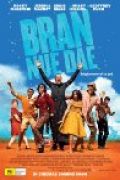
Directed by
Rachel Perkins
88 minutes
Rated PG
Reviewed by
Bernard Hemingway

Bran Nue Dae
Synopsis: It’s the summer of 1969 and teenage Willie (Rocky McKenzie) is preparing to leave home for the seminary at Clontarf where he is being trained for the priesthood as his mother wants. Willie has his mind on other matters, notably the girl loves and so he runs away from the seminary and heads back home.
Bran Nue Dae is based on a stage musical that toured Australia successfully during the early 1990s. With its genre-typical story of young love’s rocky road, some catchy tunes and a mild dash of socio-political criticism it’s easy to imagine why it pleased audiences back then. So, with a talented cast and crew, a decent budget and looking splendid, why doesn’t the film work as well as it should?
Whilst the best musicals have stories and characters of substance, as Ginger and Fred movies amply demonstrate, what we love about the genre is the songs and the dancing and if they’re good enough we’ll overlook virtually any banality. Bran Nue Dae is not banal but equally it doesn't realize the potential which was presumably achieved in the live performances. Often film musicals take over a good number of the cast from the stage production and because the performers both know their stuff inside out and are familiar with each other, benefit greatly as a result.. Clearly this was not an option here and it is a limitation over which Ms. Perkins has not triumphed. Her previous efforts have included One Night The Moon (2001) an evocative drama about relations between indigenous Australians and white settlers with sung interludes and the critically-acclaimed television series on Aboriginal history, The First Australians (2008). So getting her to direct the film version is an understandable choice but the result indicates that it wasn't necessarily the best one.
The songs in themselves are not the problem but rather the way that they are shoe-horned into the story. In general they lack motivation within the narrative setting. Thus after the delicious opening credits and a reasonable but disappointingly non-committal gospel number, we get treated to a rockabilly style song about semen. It bounces along nicely but why in 1969 Outback Western Australia anyone would be singing about jizz is a difficult question to answer. Then when our timorous hero Willie is about to be corporally punished by Father Benedictus (Geoffrey Rush) he breaks into what is more or less the film’s signature tune, an ironic land-rights focussed affirmation of the delights of being an Aboriginal. One might ask where this political consciousness came from. Later Missy Higgins as a dippy hippy chick sings a love ballad while swimming in a rock pool with her daggy German boyfriend (Tom Budge) but it comes too out-of-the-blue to have resonance. And when Willie finally returns to Broome, his true love. Rosie (Jessica Mauboy), is singing a swing version of Tammy Wynette’s “Stand By Your Man” (which, by-the-way, was only released in the US in late 1968) but who is her man? Handsome and cool Lester (Dan Sultan) or the shy, unfortunately-named Willie? It doesn’t really matter, the story simply continues on its merry way.
If the songs don't feel well integrated with the narrative they are also not well staged. The jizz-song has great potential as a showcase for rock’n’roll dancing but despite having marshalled dancers for the purpose it never develops into anything; the signature number in the seminary has prominent tap-dance sounds but no-one tap dances; and the water-hole number should have had Higgins naked (what self-respecting flower child would have swum in a two-piece!). Even the numbers that have the most obvious potential as choreographic set pieces such as the disco-Zorba number never amount to much. Surely spending money on some decent choreography would have been been worthwhile (only Willie’s dream stands up as a dance number presumably because it draws largely on traditional Aboriginal moves). David Bridie’s music production is too engineered, giving the songs a manufactured quality that is inconsistent with the naturalism of the actual performances and the historical context. And if all this wasn’t bad enough, too often the songs are either begun abruptly and/or truncated in the same fashion rather than given the space they deserve
Whilst the stiff-necked German accents of the Rush and Budge characters may have been amusing on stage, under the less generous gaze of the camera they appear clumsy although Budge’s puppy-dog-like “Mutter?” deserves some acknowledgement for its sheer ridiculousness. Ms Perkins plays it for the broad comedic strokes and the cast are excellent in responding, with Magda Szubanski playing a roadhouse slattern, Deborah Mailman stealing the show as the classic good-natured gin and Dan Sultan indicating great potential as a new generation pin-up boy. Ernie Dingo as the lovable and wise-in-the-ways-of-the-world Uncle Tadpole, a role he played in the original stage production, gives a winning performance that anchors the to-and-froing of the other characters, whilst master cinematographer Andrew Lesnie ensures that the film always looks good.
As much as Bran Nue Dae disappointed me relative to the canon of film musicals I acknowledge that a less critically-motivated audience will enjoy its ribald vigour. I wish it well and encourage everyone to see it, if only to check out one of the rarest of Australian film species, the Aboriginal musical.

Want more about this film?


Want something different?




